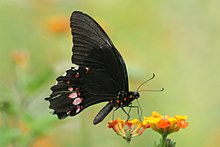Papilio anchisiades
| Papilio anchisiades | ||||||||||||
|---|---|---|---|---|---|---|---|---|---|---|---|---|

Papilio anchisiades |
||||||||||||
| Systematics | ||||||||||||
|
||||||||||||
| Scientific name | ||||||||||||
| Papilio anchisiades | ||||||||||||
| Esper , 1788 |
Papilio Anchisiades is a butterfly ( butterfly ) from the family of the swallowtail butterfly (Papilionidae).
description
butterfly
The wingspan of the moth is 70 to 100 millimeters. All wings have a black-gray to deep black basic color. The apex is pointed and slightly curved outwards. On the top of the forewings there is a milky white spot on some specimens. Typical of the species is a large light red to ruby red spot on the upper side of the hind wings close to the tornus , which is traversed by black veins. The species is therefore referred to in English as the Ruby-spotted Swallowtail or Red-spotted Swallowtail . Due to the distinctive drawing elements, the species is unmistakable. The hind wings are notched, but the tails that are usually typical for this genus are missing . The undersides of the wings correspond in color to the upper sides, but are somewhat paler in color.
egg
The spherical eggs have a yellow-brown color and are laid in numbers on the leaves of a food plant.
Caterpillar
Younger caterpillars are fleshy in color, adults are marbled brown and have some cream-colored spots. They try to protect themselves from predators through mimesis ; they are sometimes reminiscent of bird droppings.
Doll
The doll is light brown in color and marbled with a greenish tinge.
distribution and habitat
The range of Papilio anchisiades extends from Texas further south to Argentina . Towards the northeast, the species has also been identified as a rare migratory butterfly in Kansas . It prefers to colonize subtropical forest areas and citrus plantations .
Way of life
The moths form several generations per year, which can be found from April to November. They like to visit different flowers to take in nectar or take in liquids and minerals in damp places on the earth. The caterpillars live gregariously and feed on the leaves of various diamond plants (Rutaceae) at night , for example bergamot ( Citrus × limon ) or Casimiroa edulis in Mexico . During the day they rest on tree trunks.
Subspecies
The following subspecies are known:
- Papilio anchisiades anchisiades Esper, 1788; Venezuela , Colombia to Guiana , Peru
- Papilio anchisiades lamasi (Brown, 1994); Ecuador
- Papilio anchisiades idaeus (Fabricius, 1793); Texas, Mexico to Panama
- Papilio anchisiades capys (Huebner, 1809); Bolivia , Paraná , Argentina, Paraguay
- Papilio anchisiades philastrius Fruhstorfer, 1915; Trinidad
swell
Individual evidence
- ↑ Butterflies and Moths of North America http://www.butterfliesandmoths.org/species/Papilio-anchisiades
- ↑ Development cycle http://butterfliesofamerica.com/papilio_anchisiades_idaeus_immatures.htm
- ↑ Distribution http://www.nic.funet.fi/pub/sci/bio/life/insecta/lepidoptera/ditrysia/papilionoidea/papilionidae/papilioninae/papilio/index.html#anchisiades
- ↑ a b c James A. Scott: The Butterflies of North America: A Natural History and Field Guide. Stanford, California: Stanford University Press, 1986, ISBN 0-8047-2013-4 , p. 179
literature
- James A. Scott: The Butterflies of North America , Stanford University Press, Stanford CA., 1992, ISBN 0-8047-2013-4 , p. 179
Web links
- Papilio_anchisiades - Photos

